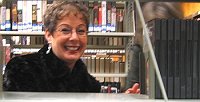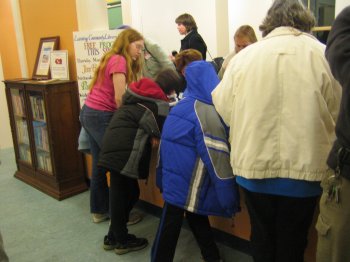- By Dan Veaner
- Around Town
 Print
Print  Lansing Community Library Center (LCLC) officials have reason to be optimistic that the library will receive a $20,000 grant to fund a computerized system, but using it may hinge on a successful vote in December. LCLC Fund Raising Committee Co-chair Donna Scott says applying for the grant now is part of forward-looking planning by library officials to meet the requirements of becoming a chartered library.
Lansing Community Library Center (LCLC) officials have reason to be optimistic that the library will receive a $20,000 grant to fund a computerized system, but using it may hinge on a successful vote in December. LCLC Fund Raising Committee Co-chair Donna Scott says applying for the grant now is part of forward-looking planning by library officials to meet the requirements of becoming a chartered library."If we get the charter, then we have to buy the Polaris system," Scott explains. "The great thing about this grant is that if we get the charter this will save the library money. It's a good example of another way we have been fiscally responsible and conservative. This will make it so we can easily stay within our budget and we will not have to ask the voters for an increase in the budget to pay for this."
LCLC will be asking taxpayers to pay 15 cents per $1,000 of assessed property value to create a public library from what is now a reading room of the Tompkins County Public Library. That money will be used to hire a professional librarian and for operating expenses to run the library from day to day. Scott's committee is also pursuing grants to pay for one-time expenses like the Polaris system and a security camera for the downstairs entryway. "In the future we can get grants for discrete one-time projects," Scott notes. "We can no longer get money to just run the nuts and bolts of the library. That kind of money is drying up, and we just don't have the volunteers to raise it."
Scott wrote a grant application to the Triad Foundation, an offshoot of the Park foundation that has already awarded LCLC a grant to help with the now completed capital project. The new grant would pay for the software to automate many of the library's functions, along with two computers and setting up the system and maintaining it for two years. Most functions are currently done by hand, using index cards and post-it notes.

"We'll put all the holdings of the library into it, and then have it linked to all the functions like checking out a book at the desk," Scott says. "There will be a bar code on each book, and there will be a scanner at the desk. When people come up with a big pile of books, instead of waiting around while we write down their number on each card and the return time on another card, this will make it a lot more efficient. People at the desk will stick items under the scanner, and that goes into the system. Of course the system is linked to the person's home address, phone number and e-mail address so they'll automatically get reminders before the item is due, or overdue notices if they forget to return it."
The new computers will be for staff use, but that will free up a computer for patrons to use as an electronic card catalog. The software will make the catalog accessible to both patrons and the volunteers, and to the professional librarian LCLC intends to hire if the vote passes. The system is compatible with those installed in over 1000 other libraries, and is capable of enabling on-line searches of all the LCLC holdings once the data has been entered.
But LCLC's future is far from assured. Scott says that if the December 11th vote fails there is a good chance the library will close its doors within six months. "We may have to turn back the grant," she worries. "Ethically we should not spend the money on a big system if we can't stay open."
Scott's co-chairwoman Deb Harper recently got a $5,000 grant from the John Ben Snow foundation to pay for a security monitor so people working at the desk upstairs can see who is coming into the downstairs door, that must be kept unlocked for wheelchair accessibility. "Some of the people who work up at the desk feel unsafe. There is a buzzer that lets us know when somebody has gone in or out, but we don't know whether they have gone in or out. We don't know who it is, sometimes because they stay downstairs to look at the art show, or the references."
Scott says that if the vote doesn't pass that grant may also have to be returned. "That's another one we would ethically have to return if the vote doesn't pass," she says. "A no vote is going to make the future seem very unclear."

Library officials have met a number of setbacks as they have tried to get public support for a library. With a record of fiscal responsibility that has kept LCLC in the black since its inception, volunteers raised enough money for two capital projects that transformed the dark, crowded former school house and town hall into a warm, welcoming, functional library space. This was entirely paid for by private donations, and the result is a library building that has no mortgage.
But officials say that volunteer energy and private funding for day to day operations is drying up. In may they asked taxpayers for an annual 17 cents on the $1,000 of assessed value to enable the library to hire a professional librarian and to pay for operating expenses and some programs. That vote failed by 34 votes, in part because some voters thought it was asking for additional money for the schools. LCLC shares district boundaries with the Lansing School District, legally requiring the Board of Education to stage the vote. Putting it on the same ballot with the school budget may have doomed the initiative.
The new vote will ask for only 15 cents, and will stand alone on the ballot. Library officials pushed hard to move the vote inside the library so that voters could see what they would be paying for if it passed. But school officials insisted that it be held at Lansing Middle School, because vagaries in New York State law made them fear the result could be legally challenged if not held on school property.
Despite these blows, library officials are optimistic that Lansing will fund LCLC. For most homeowners it will amount to the cost of one hard cover book, and it will bring tax monies back to Lansing from county, state and federal governments. It will also make LCLC part of the wider state library system, which the use of the Polaris software will facilitate. If the grant is approved by the Triad board at its November meeting, LCLC will be poised to get it installed and train volunteers in its use if the December vote also passes. "We're optimistic that this time the vote will pass and we'll just be able to go ahead and do this wonderful thing," Scott says.
----
v3i43



